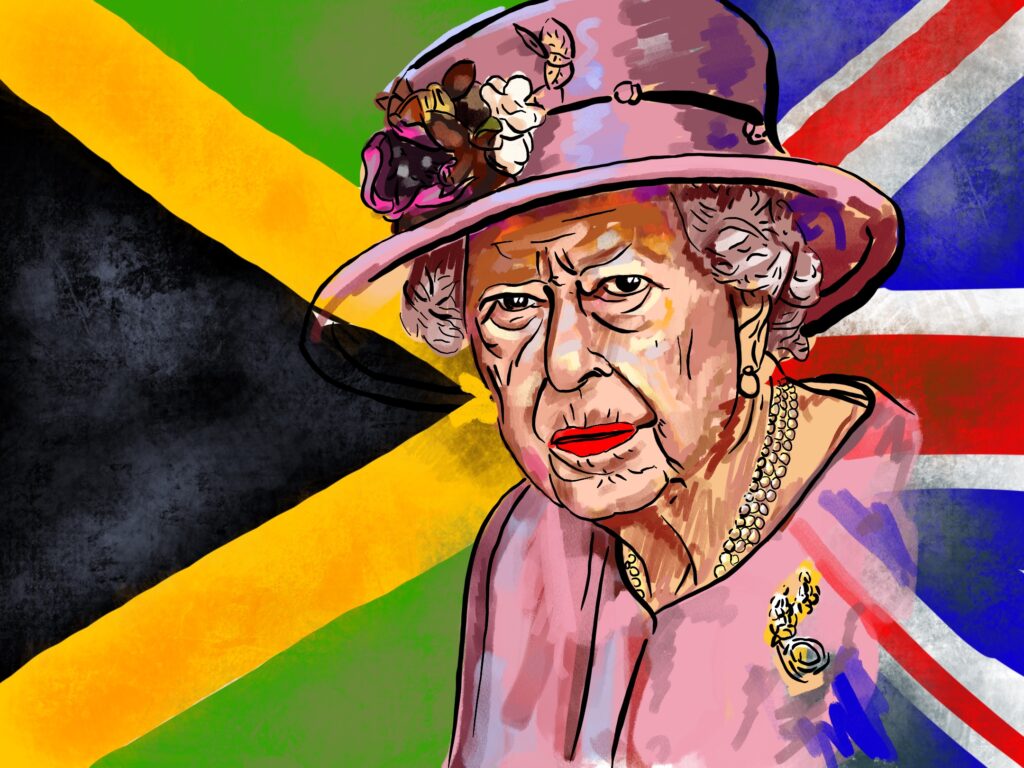
Graphic by William Gao ’24/The Choate New
In 1670, the British gained possession of Jamaica from Spain through the Treaty of Madrid after the Anglo-Spanish war. From that year forward, Britain colonized the island and enslaved thousands to produce sugar, indigo, and cacao until British emancipation in 1833. Despite that, the island remained a British colony until 1962. The same year, Jamaica joined the Commonwealth of Nations.
On March 25, Jamaican Prime Minister Andrew Holness announced that Jamaica would be leaving the Commonwealth of Nations — an organization of 54 countries that works to promote ideas to support domestic and international welfare — to become its own republic. Jamaica has been a part of this organization since its independence from British colonialism. Similarly, fellow Commonwealth member Barbados announced its intention to become a republic within the Commonwealth of Nations in November 2021. As a result, Barbados would remain a part of the Commonwealth but would no longer recognize the Queen as their Head of State. While Jamaica intends to become a republic and leave the organization, it will follow a similar trajectory as Barbados. This new chapter into Jamaican independence is long overdue, and the decision to leave the Commonwealth will hopefully inspire many other states to take charge of their future and distance themselves from the nation that has loomed over for too long.
The decision for Jamaica to leave the Commonwealth was announced abruptly with no warning or signs of intention from the public. Despite its abrupt nature, this decision has been prominent in the minds of many citizens for some time, with 55% of the public wanting to sever ties with the organization and its leader, Queen Elizabeth II. The hundreds of years Jamaica has spent in the shadow of Britain have served to the detriment of its citizens. The effects of slavery and colonialism can still be seen in the country economically and culturally. Civilian frustration could be felt as many continued to demand reparations and anti-colonialism sentiments were prevalent, intensified by global movements such as Black Lives Matter. These demands, mixed with influence from the transition to a republic from fellow Commonwealth member Barbados, contributed to the shift in Jamaica’s governmental status.
By becoming a republic, Jamaica is welcomed with many new opportunities. Primarily, the state now has an opportunity to regulate its government in a more democratic manner. Currently, Jamaica operates with a parliamentary government with a Prime Minister appointed by the governor-general of Jamaica, a representative of the Queen. As a republic, Jamaica’s government would be regulated by representatives of the people, not by a distant figurehead from a separate nation. This delegation of power is imperative as Jamaica and other countries like it need to develop individually, finding political, economic, and social structures that benefit their unique societies the best. However, participating in the Commonwealth hasn’t put Jamaica at a complete disadvantage.
The Commonwealth organization has helped Jamaica access climate change financing, trade competitively, and more. As a whole, the country has also been able to create more inclusive and sustainable development — which has been crucial to the nation’s climate — due to its Commonwealth membership. However, the Commonwealth isn’t the only connection Jamaica has to the global economy. Countries like the U.S. and Canada have played a role in helping the nation develop, and separation from the Commonwealth will not weaken these relationships.
The transition from being a part of the Commonwealth to becoming an independent republic will not be easy for Jamaica. The conversion will involve rewriting constitutions, creating new legislatures, and withstanding economic repercussions. Jamaica is aware of the effects of this transition and has already designated oversight of this to a senior figure in their government to make sure it goes smoothly. In addition, if it seeks to follow through with its departure, the nation can look to guidance from Barbados, one of the few nations to leave the organization in the past few years. Gaining true independence is a step towards strengthening national identity, one that Jamaica and many other Commonwealth nations deserve to embark on.




